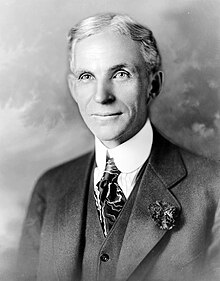Portal:Cars
The Cars PortalA car, or an automobile, is a motor vehicle with wheels. Most definitions of cars state that they run primarily on roads, seat one to eight people, have four wheels, and mainly transport people over cargo. There are around one billion cars in use worldwide. The car is considered an important part of the developed economy. The French inventor Nicolas-Joseph Cugnot built the first steam-powered road vehicle in 1769, while the Swiss inventor François Isaac de Rivaz designed and constructed the first internal combustion-powered automobile in 1808. The modern car—a practical, marketable automobile for everyday use—was invented in 1886, when the German inventor Carl Benz patented his Benz Patent-Motorwagen. Commercial cars became widely available during the 20th century. The 1901 Oldsmobile Curved Dash and the 1908 Ford Model T, both American cars, are widely considered the first mass-produced and mass-affordable cars, respectively. Cars were rapidly adopted in the US, where they replaced horse-drawn carriages. In Europe and other parts of the world, demand for automobiles did not increase until after World War II. In the 21st century, car usage is still increasing rapidly, especially in China, India, and other newly industrialised countries. Cars have controls for driving, parking, passenger comfort, and a variety of lamps. Over the decades, additional features and controls have been added to vehicles, making them progressively more complex. These include rear-reversing cameras, air conditioning, navigation systems, and in-car entertainment. Most cars in use in the early 2020s are propelled by an internal combustion engine, fueled by the combustion of fossil fuels. Electric cars, which were invented early in the history of the car, became commercially available in the 2000s and are predicted to cost less to buy than petrol-driven cars before 2025. The transition from fossil fuel-powered cars to electric cars features prominently in most climate change mitigation scenarios, such as Project Drawdown's 100 actionable solutions for climate change. (Full article...) Entries here consist of Good and Featured articles, which meet a core set of high editorial standards.
The Chrysler 180 was the base name for a series of large saloon cars produced by Chrysler Europe. Resulting from joining the development efforts of Rootes Group and Simca, the car was produced from 1970 to 1975 in Poissy, France, and later in Chrysler's subsidiary Barreiros' factory in Spain. The Chrysler 180 was also the base for the medium-sized model built by Chrysler Australia, the Chrysler Centura. Depending on the engine, the cars were marketed as Chrysler 160/180/2 litre, and since 1977 in France and rest of continental Europe as Chrysler-Simca 1609/1610/2 litres. After the takeover of Chrysler Europe by PSA Peugeot Citroën, the continental Europe models were renamed Talbot 1610/2 litres for 1979 and 1980 model years, after which the model was discontinued in Europe with the exception of Spain, where a diesel model was sold until 1982. (Full article...) Selected article - Volkswagen (VW; German pronunciation: [ˈfɔlksˌvaːɡn̩] ) is a German automobile manufacturer based in Wolfsburg, Lower Saxony, Germany. Established in 1937 by the German Labour Front under the Nazi Party, it was revitalized into the global brand it is today after World War II by British Army officer Ivan Hirst. The company is well known for its iconic Beetle and serves as the flagship marque of the Volkswagen Group, which became the world's largest automotive manufacturer by global sales in 2016 and 2017. The group's largest market is China (including Hong Kong and Macau), which accounts for 40% of its sales and profits. The name "Volkswagen" derives from the German words Volk and Wagen, meaning "people's car." (Full article...) Selected picture of the day
Selected biography -Henry Ford (July 30, 1863 – April 7, 1947) was an American industrialist and business magnate. As the founder of the Ford Motor Company, he is credited as a pioneer in making automobiles affordable for middle-class Americans through the system that came to be known as Fordism. In 1911, he was awarded a patent for the transmission mechanism that would be used in the Ford Model T and other automobiles. Ford was born in a farmhouse in Springwells Township, Michigan, and left home at the age of 16 to find work in Detroit. It was a few years before this time that Ford first experienced automobiles, and throughout the later half of the 1880s, he began repairing and later constructing engines, and through the 1890s worked with a division of Edison Electric. He founded the Ford Motor Company in 1903 after prior failures in business, but success in constructing automobiles. (Full article...) On this day November 9
Did you know...
Selected quote of the dayTo get to know a country, you must have direct contact with the earth. It's futile to gaze at the world through a car window. TopicsGeneral imagesThe following are images from various car-related articles on Wikipedia.
CategoriesThings you can do to help If you wish to help, you can:
Associated WikimediaThe following Wikimedia Foundation sister projects provide more on this subject:
Discover Wikipedia using portals |











































































